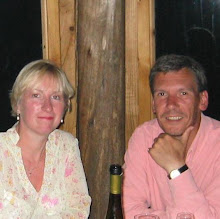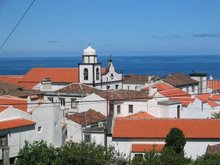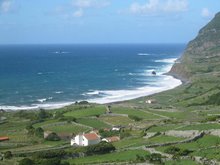I've been putting this next chapter off because it involves a topic that bores me rigid: the Romans. Can't be doing with them. I wish this were the history of Ireland because I'd be able to say "the Romans never came here" but that's not quite true for Scotland. So, dirty job, has to be done, let's just get on with it.
To remind you where we'd got to last time, the Romans landed in Britain in 55BC (might have been AD) to find it peopled by a race of Celts called P-Celts by linguists. They are also known as Britons (except those living in Scotland north of the Forth-Clyde line who are always known as Picts). Perhaps the most famous P-Celtic Briton was Queen Boadicea (or Bouddicca if you prefer the more authentic spelling. I don't.) The Britons spoke a language which is the ancestor of modern Welsh, Cornish and Breton. Across the water in Ireland (and the Isle of Man) lived the Q-Celts who are also known as Gaels. They spoke a language which is the ancestor of modern Gaelic (Irish & Scottish) and Manx.
Let me get this quickly off my chest: Gael rhymes with "gale" but the language Gaelic rhymes with "Gallic". It is not - repeat NOT - pronounced "gay-lick".
You can tell I'm putting off getting round to the Romans, can't you? Now that I think about it, I think it was 55BC that they landed in Britain first. As I recall, this was an army led by Julius Caesar which landed and fought the odd battle against the Britons but was not followed up by any attempt at conquest. I think this was when JC memorably said Veni, Vidi, Vici - We came, we saw, we conquered - although I could be totally wrong about that because, as I've said, no attempt at full blown conquest was made in 55BC and I think the whole thing had a lot to do with JC proving a point to someone back in Rome (Brutus? Mark Antony?) that he could have conquered Britain if he'd wanted to.
In 43AD (I think it was), the Emperor ...

... Claudius (Derek Jacobi) needed to prove a point to someone (I forget who, Nero or Caligula or someone like that) and decided to go one better and launch the actual conquest of Britain. Being the neat, symmetrical sort of people that they were (just look at how straight their roads were), the Romans would have loved the neat symmetry of being able to conquer the whole of Great Britain. And having conquered Asia Minor and seen off Hannibal and Carthage and so forth, you'd have thought GB would have been a dawdle but not so. Net upshot was the Romans whacked up villas, forums, temples, baths, hypocausts and all the other paraphernalia of Pax Romana in the south and east of GB but the veneer of Roman civilisation thinned the further and north and west you went until you get to Scotland where there is not a villa, bath or hypocaust to be found - only Roman forts. Which shows that all they ever did here was fight rather indecisive campaigns. In the 1st century AD, Scotland was to Rome what Afghanistan is in the 21st to the USA - i.e. a God awful place nobody would voluntarily want to have anything to do with but to which a certain amount of time and effort has to be paid because the natives can be tiresome if left to their own devices.

That's a picture of the remains of a Roman fort at Newstead near Melrose - not exactly Petra, is it?

... Claudius (Derek Jacobi) needed to prove a point to someone (I forget who, Nero or Caligula or someone like that) and decided to go one better and launch the actual conquest of Britain. Being the neat, symmetrical sort of people that they were (just look at how straight their roads were), the Romans would have loved the neat symmetry of being able to conquer the whole of Great Britain. And having conquered Asia Minor and seen off Hannibal and Carthage and so forth, you'd have thought GB would have been a dawdle but not so. Net upshot was the Romans whacked up villas, forums, temples, baths, hypocausts and all the other paraphernalia of Pax Romana in the south and east of GB but the veneer of Roman civilisation thinned the further and north and west you went until you get to Scotland where there is not a villa, bath or hypocaust to be found - only Roman forts. Which shows that all they ever did here was fight rather indecisive campaigns. In the 1st century AD, Scotland was to Rome what Afghanistan is in the 21st to the USA - i.e. a God awful place nobody would voluntarily want to have anything to do with but to which a certain amount of time and effort has to be paid because the natives can be tiresome if left to their own devices.

That's a picture of the remains of a Roman fort at Newstead near Melrose - not exactly Petra, is it?
The Romans did, however, provide Scotland with its first recorded battle and, indeed, its first recorded Scotsman: he was called Calgacus and was the chief of a tribe called Caledonians - as I understand it, the Caledonians were not so much a tribe as perhaps a confederation of Pictish tribes got together for the purpose of opposing a particular Roman campaign. The battle was at a place called Mons Graupius and was in 84AD I think (could be wrong about that exact date - as I've said before this is history without looking it up). Nobody's exactly sure where Mons Graupius was but mons being Latin for hill, and noting the similarity between Graupius and Grampians (a mountain range in north east Scotland), somewhere in the NE Highlands of Scotland is suspected (western Aberdeenshire, perhaps).
Calgacus/the Caledonians lost the Battle of Mons Graupius but not entirely in vain because Calgacus also left behind Scotland's first memorable quotation: "They make a desert and call it peace." Referring to the Romans, he's supposed to have said this in a speech to his troops before the battle (a la Mel Gibson in Braveheart except in a more authentically Caledonian accent one would hope). He almost certainly said no such thing but a Roman writer - Tacitus, I think, but might be Pliny the Elder or someone else - claimed that he did.
Quick word about Hadrian's Wall. It's commonly assumed this was the Romans shutting the door on Caledonia. Not quite true because, if that were so, it would have all its defences pointing north. But archaeologists will tell you it is equally defended on both sides so its function was rather to monitor the movement of people north and south. An example of history never being quite as simple as it appears at first sight. There was also a less well known Roman wall further north between the Forth-Clyde line called Antonine's Wall - I can't remember the chronology of that: I think Hadrian's Wall was built in the 3rd cent. AD.

That's a picture of a bit of the Antonine Wall. It's a bit of a broken pot as Roman remains go: it's not exactly the Colosseum. So in general terms, as a Scotsman, you can safely answer the question "What have the Romans ever done for us?" as "Nothing".
Apart from the first Scotsman ...
OK apart from the first Scotsman, what have the Romans ever done for us?
The first battle ...?
OK apart from the first Scotsman and the first battle, what have the Romans ever done for us?
The first memorable quote ...?
OK apart from the first Scotsman, the first battle and the first memorable quote, what have the Romans ever done for us?
Hadrian's Wall ...?




1 comment:
Your view of history is hysterical - you should write a book!
Post a Comment